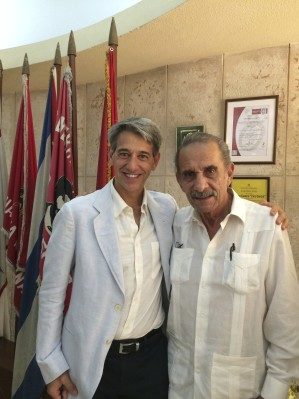Dr. Edmund Pribitkin, a professor and academic vice chair of Thomas Jefferson University’s Department of Otolaryngology – Head and Neck Surgery, came to Wharton’s EMBA Program in Philadelphia to learn how to innovate in the health care field.
We asked Edmund, who at 55 is one of the older students in the program, to tell us more about his decision to get an MBA and his experience at Wharton. Here is what he said:
Why I Went Back to School
I had reached a point in my career where I wanted to reinvent myself and become more relevant with regard to current health care issues. In health care, the underlying business proposition seems to be a unifying theme for clinical, research, and educational efforts. I wanted to better understand that business proposition and learn the language of business, which is becoming increasingly important in medicine.
I also wanted to learn how to help innovate in my field. My mentor in academics, Dr. Dick Goode, taught me that innovation comes from finding new perspectives. I realized that many of the things I’ve learned in life haven’t come directly from medicine, but from being open to ideas outside of my field. That has allowed me to succeed in unexpected ways.
In medicine, we now have guidelines for everything. That puts considerable constraints on our ability to think outside the box and make breakthroughs – but innovation and breakthroughs are critical for the future of medicine. I wanted to get an MBA to develop strategies for innovating within these constraints and to learn how to develop business arguments for innovation.
Coming to Wharton’s EMBA Program was a simple decision. I applied the same litmus test to this decision as I do to every other major decision in my life. I asked myself if I was excited about doing this. The answer was: Yes! I was very excited to go back to school.
As for the program, it was Wharton or nothing. I planned to stay in Philadelphia and the quality of the school was extremely important, especially if I wished to pursue other positions at elite academic institutions. I wanted the Wharton MBA to be the last line on my resume. That line is very empowering.
Balancing Work, School, and Family

To balance everything, you need to have a hierarchy of values and a list of priorities. Then you need to follow those values and priorities without regret. For example, my children are a priority. If my son comes home and needs help with his science homework, then my Wharton homework will have to wait because his needs take priority.
If my daughter has an important track meet, then that is my priority. I am willing to accept any consequences of those decisions. The point is that you can’t serve two masters at the same time. I knew coming into the program that there would be Wharton days and there would be non-Wharton days. Fortunately, my family and my work team are all very supportive.
There’s actually a group of us in our mid-50s in the program, but we’re all here to learn regardless of our age. There is a magic in discovering something for the first time. There’s an energy and excitement similar to what I had in college or graduate school when learning something new. It’s wonderful to be able to experience this again later in life.
Light-Bulb Moments
There are many light bulb moments that have happened at Wharton that would never have occurred had I not come here. There is no price too high to pay for those moments. And they don’t just come from professors, but also classmates. I’ve learned so much from my colleagues. There are people here who have much richer professional life stories and are younger than me – and it’s exciting to hear their perspectives.
At the same time, I can bring perspectives from the passage of time. When we talk about business cases from the 1960s and 1970s, I remember those cases – like the gas shortages of the 1970s and waiting in line to buy gas. Everybody is learning from each other and brings different gifts to the table.

I came up with an idea for an anti-snoring device and pitched it in a class. The device didn’t make it through to the final innovation round, but after the class ended a classmate (Pat Cernetti) asked if I was interested in developing the idea with him.
We started talking and that led to an independent study and now we’re forming a partnership to develop the idea. Wharton Prof. Karl Ulrich and Prof. Robert Meyer have helped us solidify our plans and we’re using all of our Wharton tools to take this to the next level. Working with Pat on this venture has been an incredible experience.
On Highlights

Another high point of the program was visiting Cuba for Global Business Week, where we learned about health care and tourism in that environment. Playing dominos with local Cubans and getting to know their thoughts on issues in Cuba was a priceless experience.
Other highlights were my amazing learning team members, who will be lifelong friends, and the opportunity to work on an independent study with Prof. Dave Robertson on innovation.
I recently attended an information reception for Wharton’s EMBA program and someone asked me if I would do this program over again. The answer was: Yes, in a heartbeat. It has added a richness and depth to my professional and personal life that wouldn’t have been there otherwise.
Posted: June 6, 2016



















